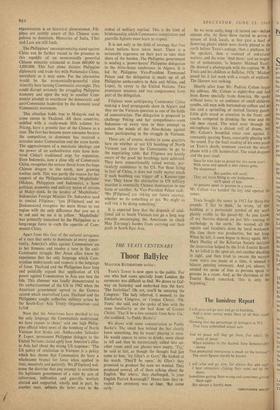THE YEATS CENTENARY
Thoor Ballylee
MALCOLM RUTHERFORD writes : Yeats's Tower is now open to the public. For one who had come specially from London the ceremony was difficult to find. We drove to Gal- way on Saturday and embarked into the bars. 'The festivities? Oh yes, you'll be meaning the Congress.' The lady referred, it seemed, to the Eucharistic Congress, or Corpus Christi. 'Oh, Yeats,' she said, and she spoke of him with the same familiarity as she had done of Corpus Christi. 'That'll be a few minutes from here. Go,' she confided. `to Paddy Burke's.'
We drove with some concentration to Paddy Burke's. The small boy behind the bar clearly knew something, but he wasn't playing at once. He would appear to serve us drinks, seem about to tell and then be mysteriously called into an- other room until our glasses were empty. Try,' he said at last, as though the thought had just come to him, 'try Glyn's at Gort.' He looked at his watch. 'They'll be open.' At Glyn's they promised to produce the man we wanted. They produced several, all of them talking about the English. 'But where,' they challenged, 'is your English Patrick Kavanagh?' Hours later they re- vealed the ceremony was at four. 'But come early.' So we went early, long—it turned out-7-before anyone else. At three there started to arrive a stream of Irish locals, at five past a load of flowering plants which were slowly placed in the earth before Yeats's cottage, then a platform for the speakers, then a vanload of red-coated waiters, and the wine. 'And there,' said an inspec- tor of monuments, 'is Senator Michael Yeats. He showed a photograph with the caption 'W. B. Yeats and his children at Ballylee, 1926."Michael posed for it last week with a couple of orphans. The likeness was striking.
Shortly after four Mr. Padraic Colum began his address. Mr. Colum is eighty-five and had been flown specially from America. He spoke without notes to an audience of small children. youths, old men with buttoned-up collars and no tics and a sprinkling of invited literary guests- Little girls stood at attention in the front, and youths competed in drinking the wine and the old men stared. The wind went through the microphone like a distant roll of drums, but Mr. Colum's beautiful voice rose against it. constantly quoting Yeats, constantly playing with the sound. For the final reading of his own poem on Yeats's death, someone covered the micro- phone with a silk handerchief. The wind dropped and the poet read: Since he who kept us proud for two score years With verse and speech is into silence gone,
No eloquence!
But candles will avail;
They arc more fitting to our hushedness we'll speak of him As persons speak to persons in a room . . .
Mr. Colum was handed the key and opened the tower.
Yeats bought the tower in 1917 for thirty-five pounds. 'I like to think,' he wrote, 'of that building as a permanent symbol of my work plainly visible to the passer-by. As you know, all my theories depend on just this—rooting 'of mythology in the earth.' He wanted all th'e repairs and furniture done by local workmen. His time there was productive, but not long. When he left, it soon began to decay again. Mrs. Mary Hanley of the Kiltartan Society initiated the restoration helped by the Irish Tourist Board. As we lolled in the open air, not another dwelling in sight, and then tried to swarm the narrow stone stairs too many at a time, it seemed a bizarre opening ceremony. And yet, almost, it seemed we spoke of him as persons speak to persons in a room. And, as the chairman of the Tourist Board remarked, 'this is only the beginning.'






































 Previous page
Previous page